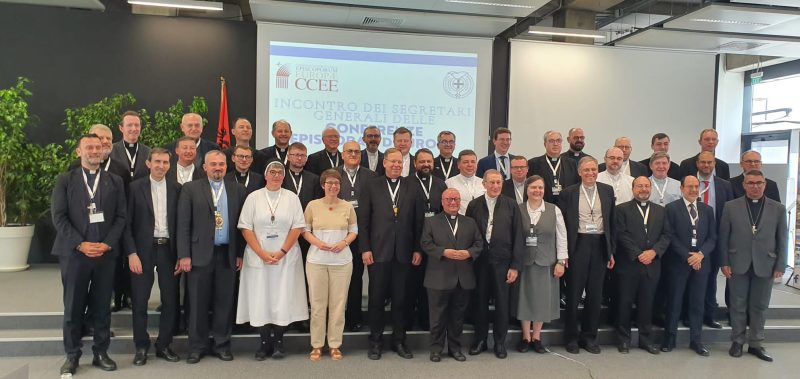From 22 to 25 June, the annual meeting of the General Secretaries of the European Bishops’ Conferences was held in Tirana, Albania, entitled: “From Ecclesia in Europa to the Synod on synodality: The Church in Europe on the move 20 years after Saint John Paull II’s Exhortation”.
Welcomed by the Albanian Bishops’ Conference, the General Secretaries also had the opportunity to celebrate Holy Mass in Tirana Cathedral, in the Church of Saint Lucia in Durres, and at Bethany House, one of the works of mercy visited by Pope Francis during his trip to Albania on 21 September 2014, which was also the first Apostolic journey of his Pontificate.
Introducing the proceedings, Bishop Gjergj Meta, General Secretary of the Albanian Bishops’ Conference, recalled that the theme of the work addresses three important realities such as “the Church, Europe and the Synod”, and recalled that “the Church is first and foremost a mystery that reflects light, the Church is the bride of Christ who is to be loved and served, and the Church has impregnated Europe with the Gospel from which the great commandment of love is primarily derived”.
Archbishop Gintaras Grušas, President of the Council of European Bishops’ Conferences, recalled how within St John Paul II’s Ecclesia In Europa, of which the 20th anniversary of its promulgation would be celebrated on 28 June, were already many of the challenges that are still current in Europe today: from the need for a profound education to putting Christ at the centre, but also the risks of technocracy, the construction of a non-Christian world, the Church’s commitment to bring the hope of Christ to all.
“As we experience a new war in the heart of Europe today – said Archbishop Grušas – we look to the words of St John Paul II with the awareness that our first commitment must be precisely to look to Christ as the hope of Europe. Only with Him, and through Him, can we create a city of man in Europe that is at peace with its history, reconciled and directed towards a prosperous future because it is built in the integral development of every man and woman”.
The first session of proceedings was introduced by a report from Archbishop Charles J. Scicluna of Malta, on the theme “What is the hope for the Church in Europe?”. Reviewing the major passages of Ecclesia in Europa, Archbishop Scicluna pointed out that the Exhortation emphasised certain challenges that clouded hope, such as “the loss of Christian memory and heritage”, but also the signs that instead open up that hope. In particular – said the Archbishop of Malta – John Paul II offered as a practical programme for the Church in Europe four points: proclaim the mystery of Christ, witness in unity and dialogue, communion with particular Churches, together with all believers; evangelise the social life.
In the second session of the proceedings, they discussed on the “Hope-filled presence in a post-Christian world: a practical perspective on the New Evangelisation in Europe”. The report was entrusted to Dr. Johannes Hartl, director of the House of Prayer in Augsburg. Drawing on his experience as a facilitator of prayer meetings, Hartl called for a posture of humility towards the challenges of the world, which means “leaving one’s own convictions behind by going to the level of others”, because “many secularised people have no idea what the Church really is”. He invited those present to “focus on the mission”, having a perspective that “puts God at the centre”, emphasising that this was also one of the approaches of Ecclesia in Europa.
The third working session dealt with the reception of the Prague Final Document and the presentation of the Instrumentum Laboris for the Synod. It was Father Giacomo Costa, SJ, to deliver the report. Father Costa is a consultant to the General Secretariat of the Synod and was also the coordinator of the Drafting Committee of the Final Document of the Continental Assembly of the Synod held in Prague from 5 to 12 February 2023.
Father Costa emphasised that it is not correct to define it as a “Synod on Synodality”, as it is rather a “Synod on the Life of the Church”, which seeks to understand how this life can be articulated around “Communion, Mission and Participation”. The consultant of the Synod Secretariat – who also took part in the assemblies of North America, South America and Asia – emphasised that the continental stages showed some common challenges, including the loss of memory, the fear of facing the future, the weakening of solidarity, the spread of an anthropology without God and without Christ.
He went on to emphasise that the Synod should not be experienced as a confrontation in which there will be winners and losers, because “the Faith is not a divisive factor as the history of Europe would seem to suggest”. Regarding the European continental stage, he recalled that the meeting was “the only one without a pre-prepared document”, because it wanted “total transparency and participation”. It was, according to Father Costa, a “spiritual experience that showed us that we can dialogue”, so much so that many “said they want this style to become the style of the Churches”.
Father Costa also recalled some moments of “tension” in the debate in Prague, for example in the relationship between aggiornamento and fidelity to tradition; in that of a polarisation that describes a secularised West and an anti-modern East; on how to hold truth and love together. Behind these tensions, he said, “there is a pluralism in conceptions of mission”.
The General Secretaries all gave a brief report on the challenges they are facing in their countries, presenting a particularly varied situation. Their reports were joined by those of the General Secretary of the Commission of the Bishops’ Conferences of the European Union (COMECE) and those of the Secretaries of the CCEE Commissions for Youth, Family and Life, Evangelisation and Culture, and Social Pastoral Care.

